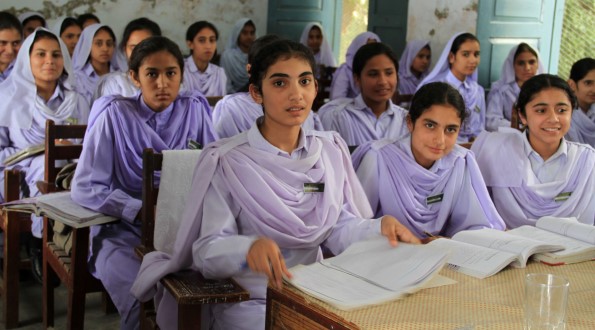BECOME A MEMBER
>JOIN
Pakistan Works on Bridging the Gender Gap

Pakistan, recently named the second-worst country in terms of gender equality, is working to improve its image in terms of women's right and equal opportunity.
Of 136 countries listed, Pakistan ranked second only to Yemen in terms of gender bias issues, according to the Global Gender Gap Report 2013, which was published October 26.The index focuses on the economic, political, educational and health sectors and provides country rankings that allow for effective comparisons across regions and income groups and over time.
"Women's empowerment is not a sudden phenomenon," Dr. Waqar Masood Khan, federal finance secretary, told Central Asia Online while commenting on the report. "It might take longer for these girls to taste empowerment at home, but the economic prospects created by their hard work ultimately revealed the value of their labour." Encouragingly, Pakistan ranked 64th when it came to political empowerment of women, having a history that includes a female prime minister, the late Benazir Bhutto.
Improvement of education
One way to boost the country's gender-equality index is through improving education for girls, advocates said."Education is the need of the time," Punjab School Education Department Secretary Abdul Jabbar Shaheen said. "No nation can develop without investing in girls' education because they constitute half of the human resources and skills of the country." While talking about the report specifically, which tagged Pakistan as the eighth worst in terms of equal access to education, he pointed out to recent progress in the field, particularly in Punjab and Sindh.
Lahore has 20,001 boys' schools, 18,040 girls' schools and 1,564 mixed schools, educating more than 2.1m boys and almost 1.8m girls, he said, citing a 2012 Lahore primary school census. "The local and federal governments are working to provide better education facilities," he said. "Since 2003, they've provided free textbooks and a monthly Rs. 200 (US $1.86) stipend for girls in classes 6 through 10 in 15 low-literacy districts," he said.
Effective legislation
Pakistan has much to be proud of in terms of women's political power, Sindh Information Minister Sharjeel Memon said, noting its ranking in that arena. The women's parliamentary caucus, a bipartisan group of woman parliamentarians, is trying to pass legislation that would set aside 10% of seats in parliaments and union councils to female candidates, he added. A number of laws meant to harness the economic potential of half of the country's population and to improve women's standing in society have taken effect.
They include the Prevention of Anti-Women Practices (Criminal Law Amendment) Bill. It prohibits depriving women of their inheritances and forcing them to marry someone or a copy of the Koran simply to settle a dispute. The Protection against the Harassment of Women at the Workplace Act 2010, National Commission on the Status of Women Bill 2012 and an amendment to the Criminal Law Act (section 509) all provide additional safety nets for women, Memon added. More than 9m women have entered the workforce during the last decade, Waqar said. "Young girls from the lower and lower middle classes are exposed to a new world when they come to work," he added.
For the government, the Millennium Development Goals remain a top priority, as do other international commitments on women's empowerment that it is pursuing, he said. The government is striving to develop the economy, enable Pakistanis to live better lives and foster gender equality, Waqar said, citing the Economic Survey of Pakistan 2012-13.
Originally published by Central Asia Online.

